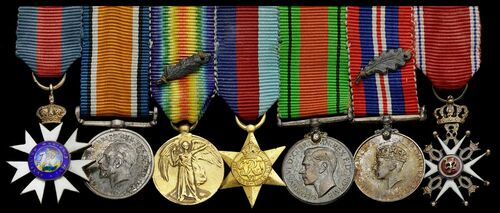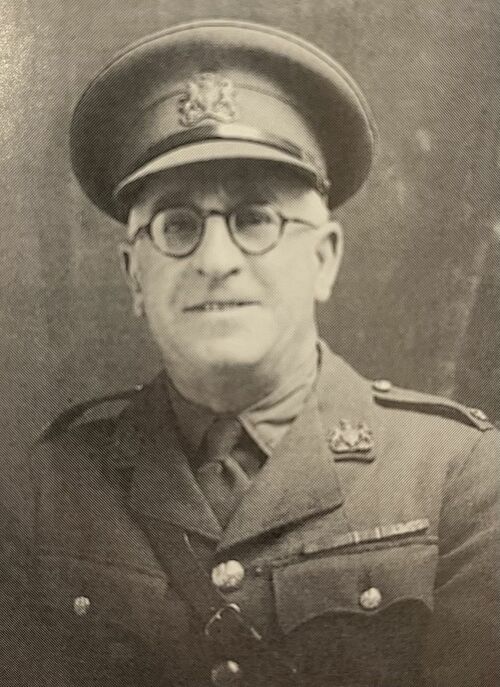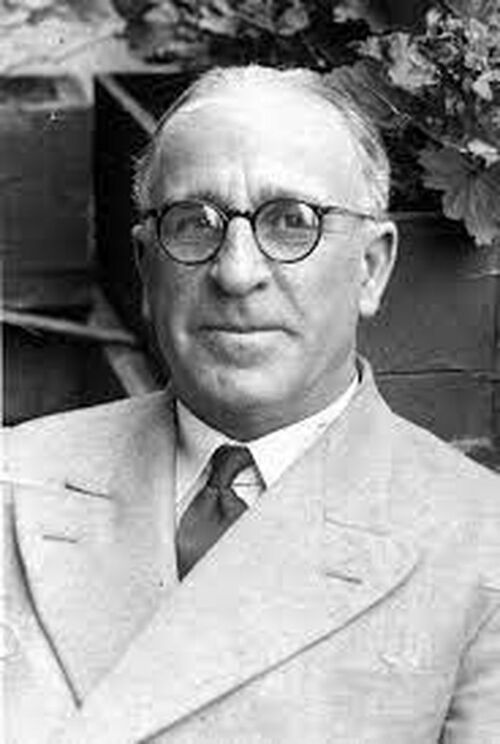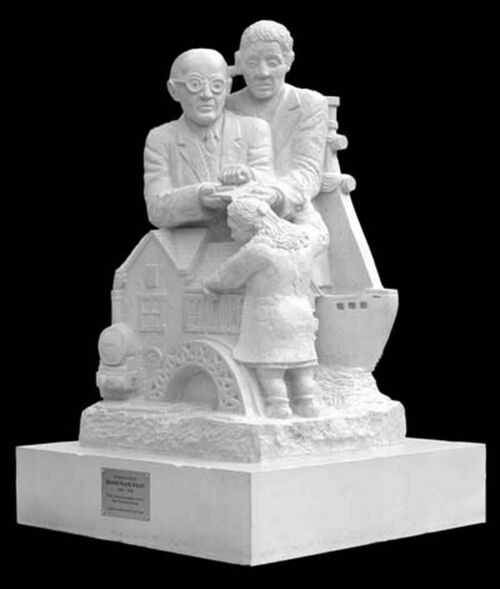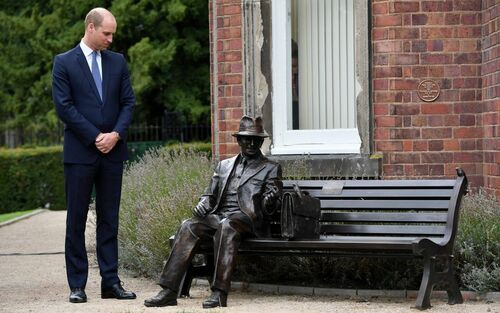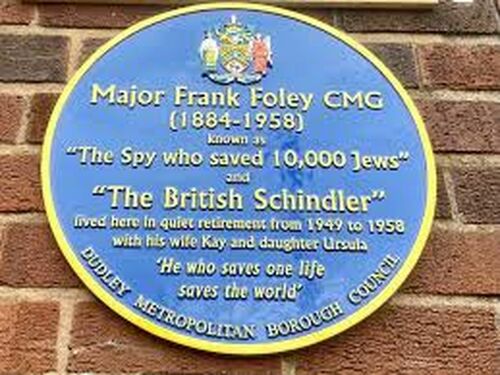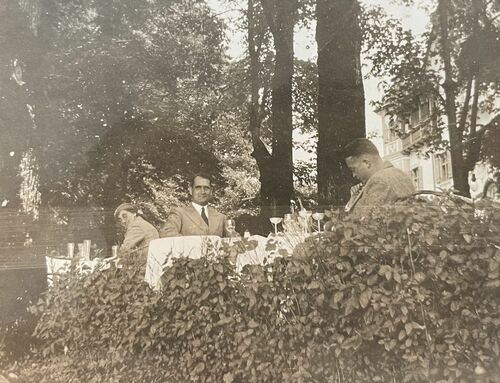Auction: 23001 - Orders, Decorations and Medals
Lot: 472
'Frank Foley risked his life to save the lives of thousands of German Jews. Without the protection of diplomatic immunity he visited internment camps and sheltered Jewish refugees in his house. Frank Foley was a true British hero. It is right that we should honour him at the British Embassy in Berlin, not far from where he once worked.'
Foreign Secretary Jack Straw, at the opening of the plaque at the British Embassy in Berlin in November 2004, the 120th Anniversary of his birth
The important C.M.G. and Order of St. Olav group of seven miniature dress medals worn by Major F. E. 'Frank' Foley, Secret Intelligence Service, - 'The British Schindler' - whose work during the Second World War saved the lives of some 10,000 Jews from the Holocaust
Having initially served on the Western Front with the Hertfordshire Regiment and then with the 2/6th Battalion, North Staffordshire Regiment - with whom he earned a 'mention' - he then joined the Intelligence Corps and post-War was a Passport Officer to Berlin, all the while in the employ of the Secret Intelligence Service (MI6)
Furthermore, having exited Germany he was chosen as the person to interrogate Hitler's deputy Rudolf Hess after his flight to Scotland and was also a key player in the establishment and running of the Double-Cross System; Foley's work ultimately came to light in the years after the conclusion of hostilities and after his death he was officially recognised as a British Hero of the Holocaust and as a Righteous Among the Nations
The Most Distinguished Order of St. Michael & St. George, C.M.G. Badge, silver-gilt and enamel; British War and Victory Medals, with M.I.D. oak leaves; 1939-45 Star; War Medal 1939-45, with M.I.D. oak leaves; Norway, Kingdom, Order of St. Olav, Badge, silver-gilt and enamel, mounted as worn by Spink & Son, 5 King Street, good very fine (7)
Purchased April 1972 from Foley's widow, which is confirmed in an original letter that accompanies the Lot.
C.M.G. London Gazette 1 July 1941:
'For services rendered to the Foreign Office.'
British Hero of the Holocaust awarded 9 March 2010. The idea of recognition was started by the Holocaust Education Trust and it had originally stated:
'[Foley] was never formally honoured by the British nation during his lifetime for his actions. We therefore call on the Government to review the current statutes governing the honours system, so that the Honours Committee can consider awarding a posthumous knighthood to Frank Foley.
We hope that this will open the way for the Honours Committee to consider recognition for other British heroes of the Holocaust, including Randolph Churchill, Sergeant Charles Coward, Jane Haining, Tommy Noble and Robert Smallbones, who risked and in some cases gave their own lives to save others.'
Righteous Among the Nations awarded in October 1999, from Israel.
Francis Edward Foley - or Frank to his friends and comrades - was born on 24 November 1884 at Highbridge, Somerset and won a scholarship to go to Stonyhurst. He then went to a Catholic seminary in France to train as a priest but transferred to the Université de France in Poitiers to study Classics, travelling widely in France and Germany. Perhaps the best account of the rest of his work is summarised by the Yad Vashem website:
'...a veteran of World War I, he was recruited to the British Secret Intelligence Service after that war and became one of Britain’s most successful spies.
He was stationed in Berlin from 1922 to 1939 and he used his position as Passport Control Officer at the British Embassy to save thousands of Jews from Nazi death camps. From 1935, an ever growing number of Jews appealed to his office in order to obtain immigration visas to Palestine, to the United Kingdom and to all other parts of the then British Empire. They came either directly or through the Palestine Office of the Jewish Agency or through the Hilfsverein der Deutschen Juden (Aid Society of German Jewry). Immigration rules were strict in those days of economic depression, but it became more and more obvious that there was a growing need of Jews to leave Germany. Defying the Foreign Office, he bent the rules to issue 10,000 visas for British Mandatory Palestine.
He did not enjoy diplomatic immunity in Berlin and was running a serious risk. Had he been exposed by the Nazis, he would have suffered a much worse fate than being persona non grata.
Miriam Posner, who was 16 when she travelled from East Prussia to beg for a visa to Palestine, even though she did not meet Britain’s stiff conditions for entry, said:
“Foley saved my life. We heard that there was this man Foley who was kind to the Jews. My mother begged him. He just paced up and down a little and then asked for my passport and put the visa stamp on it. He did not ask any questions. He was small and quiet. You would never suspect he was a spy.”
Ze’ev Padan’s father was interned in Sachsenhausen concentration camp when Foley went to rescue him. Ze’ev too was saved by Foley’s defiance of authority. Foley was described in Adolf Eichmann’s 1961 trial by one of the witnesses, Benno Cohen as follows:
“There was one man who stood out above all others. Captain Foley, a man who in my opinion was one of the greatest among the nations of the world. He rescued thousands of Jews from the jaws of death.”
By the time of the infamous Kristallnacht pogrom in November 1938, Foley and his wife had taken to sheltering Jews overnight in their apartment. Among the “guests” was Leo Baeck, chairman of the Association of German Rabbis. When the war started and Foley left Germany, he left behind a thick wad of already approved visas with instructions that they should be distributed to those fleeing the Nazi terror. Reverend John Kelley, Foley’s nephew, an Anglican priest said about his uncle:
“I believe that God put Frank Foley in Berlin to do His Work. Foley did what he did as a witness to the Christian churches to show what they should have done at that time, but did not do.”
Foley died on 8 May 1958 at Stourbridge.
In 2004 a remembrance plaque was dedicated to him at the entrance to Stourbridge's Mary Stevens Park, and a statue was commissioned from sculptor Jonathan Sells and unveiled on the anniversary of V.E. Day, which is also the anniversary of his death. The 'Frank Foley Parkway' between Highbridge and Burnham-on-Sea opened on 7 July 2009. On 31 May 2009, a garden was dedicated in his memory at London's Sternberg Centre, where a plaque was unveiled by Cherie Blair. In 2012 the Foreign Secretary, William Hague, unveiled a plaque to him at the Hoop Lane Jewish Cemetery in Golders Green, London and on 18 September 2018, Prince William - now Prince of Wales - unveiled a statue of Major Frank Foley in the West Midlands town of Stourbridge in the presence of Foley's great-nephew, Stephen Higgs.
Sold together with the aforementioned letter of provenance, a secret image taken by Foley, the reverse inscribed 'Herr Rudolf Hess snapped at Hohenschwangau (facing camera)', newspaper clippings sent by his widow, and a copy of Foley - The spy who saved 10,000 Jews.
Subject to 20% VAT on Buyer’s Premium. For more information please view Terms and Conditions for Buyers.
Sold for
£3,200
Starting price
£1200

